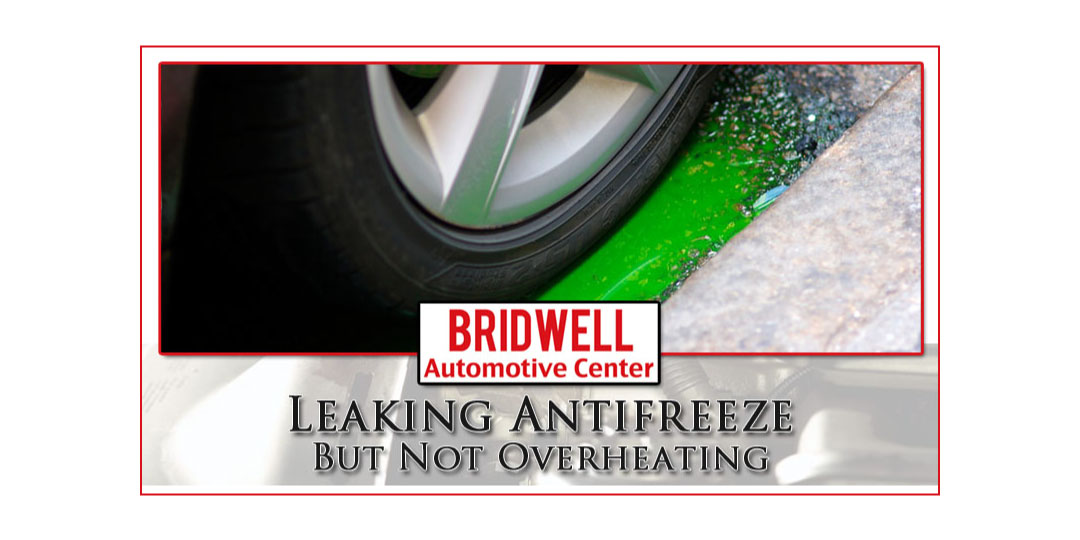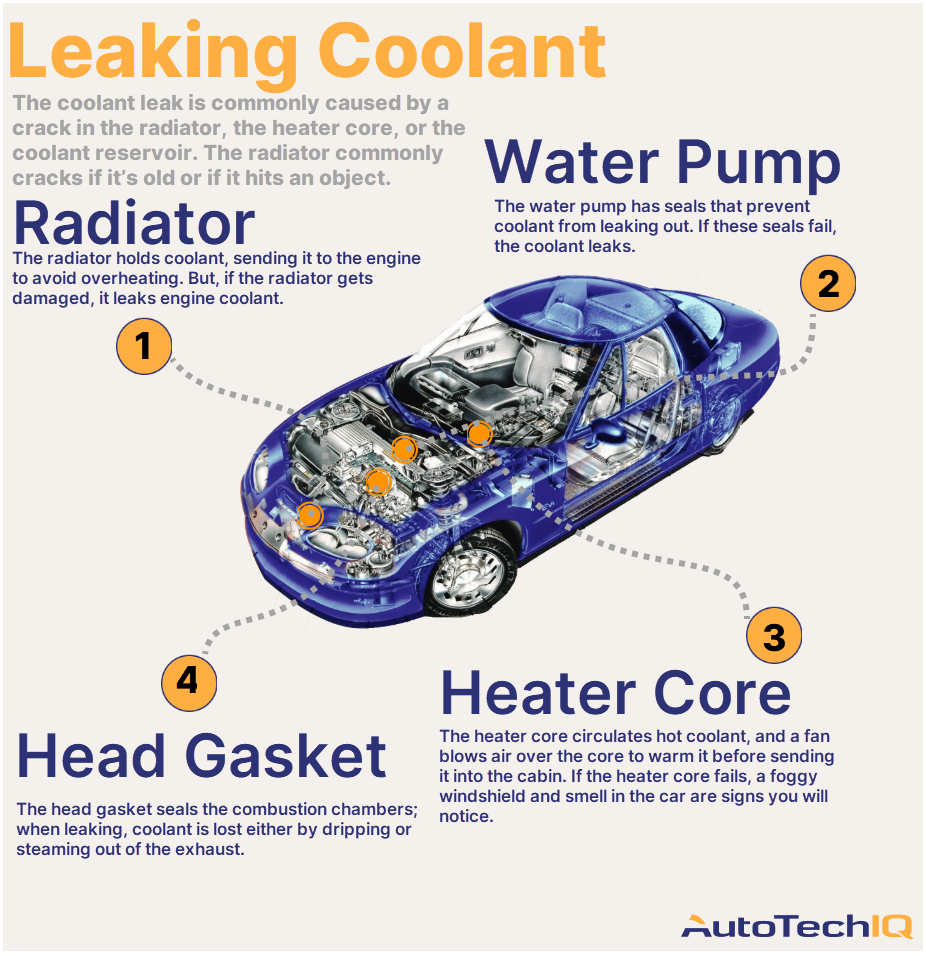If your car is leaking water but not overheating, it could be due to a coolant leak or condensation from the air conditioning system. To identify the cause, check for signs of coolant leakage such as a sweet smell or puddles underneath the car.
If there is no coolant leak, the water may be normal condensation from the air conditioning system. In this case, the issue can be resolved by ensuring the drain tube is not blocked.

Credit: www.autotechiq.com
Common Causes Of Car Leaking Water
When your car is leaking water, it can be a perplexing issue, especially if the temperature gauge doesn’t indicate any signs of overheating. To get to the root cause of this problem, it’s important to understand the common causes of car leaking water. Here are a few possibilities:
Coolant Leak
A common cause of a car leaking water is a coolant leak. Coolant, also known as antifreeze, is a crucial component for keeping your engine cool and preventing it from overheating. If you notice water pooling under your car or a sweet smell, it may indicate a coolant leak. This can occur due to a damaged hose, a faulty radiator, or a loose or damaged coolant reservoir cap.
Water Pump Failure
Another culprit for a car leaking water but not overheating could be a failing water pump. The water pump is responsible for circulating coolant throughout the engine, and if it malfunctions, it can cause leaks. Signs of a failing water pump include a whining noise, overheating at idle or low speeds, and coolant leaks from the front of the engine. It’s crucial to address water pump issues promptly to prevent engine damage.
Heater Core Problem
A malfunctioning heater core is another potential cause of water leakage in your car. The heater core is responsible for providing heat to the cabin of your vehicle. If it develops a leak, coolant can escape, causing water to leak inside the car. Signs of a heater core problem include a damp floor on the passenger side, a sweet odor inside the car, and foggy windows. This issue should be addressed promptly to prevent any further damage.
If your car is leaking water but not overheating, it’s essential to identif
Signs Of Car Leaking Water
When you notice your car leaking water but not overheating, it’s essential to understand the signs of a potential issue. Being able to recognize the signs of a car leaking water can help you take the necessary steps to address the problem and prevent any further damage. Here, we’ll explore the common indicators of water leakage in a car and what they can mean for your vehicle’s health.
Puddles Under The Car
If you spot puddles under your car, particularly after it has been parked for a while, it could be an indication of a water leak. The color and consistency of the fluid can help identify the source of the leak, such as clear water from the air conditioning system, or green or pink fluid from the coolant system. Checking the location and characteristics of the puddle can provide valuable clues to the issue at hand.
Low Coolant Levels
Low coolant levels in your car’s reservoir can also point to a water leak. If you frequently find yourself refilling the coolant, it’s crucial to investigate if there’s a leak in the cooling system. This can lead to overheating and other serious engine problems if left unaddressed.
Why Car Leaking Water But Not Overheating?
It can be quite perplexing to see your car leaking water but not overheating. There can be several reasons for this issue, and it is important to identify the cause to prevent any further damage to your vehicle. In this article, we will discuss two common causes of a car leaking water but not overheating: loss of coolant and a failed thermostat. By understanding these causes, you can take appropriate steps to fix the problem and ensure the overall health of your car.
Loss Of Coolant
One possible reason for your car leaking water but not overheating is the loss of coolant. Coolant, also known as antifreeze, plays a crucial role in maintaining the optimal temperature of your car’s engine. It circulates through the engine and absorbs heat, preventing your car from overheating. If you notice water pooling under your car and a decrease in the coolant level, it indicates a leak.
A leak in the cooling system can occur in various components such as the radiator, hoses, water pump, or even the head gasket. These leaks can be a result of worn-out parts, loose connections, or damage from external factors. Regardless of the cause, it is essential to address the coolant leak promptly to avoid any potential damage to your engine.
Failed Thermostat
Another possible cause of a car leaking water but not overheating is a failed thermostat. The thermostat is responsible for regulating the flow of coolant through the engine. It ensures that the engine reaches the optimal operating temperature and maintains it throughout your drive. If the thermostat fails, it can lead to improper coolant circulation, resulting in water leaks.
A faulty thermostat may get stuck in the closed position, inhibiting the flow of coolant. This can cause a buildup of pressure in the cooling system, leading to leaks. Alternatively, if the thermostat remains open at all times, the engine may not reach the required temperature, leading to poor fuel efficiency and performance issues.
To address the issue of your car leaking water but not overheating, you should consider the following steps:
- Inspect the cooling system for any visible signs of leaks such as wet spots or puddles under the car.
- Check the coolant level in the reservoir and top it up if necessary.
- Examine the hoses, radiator, water pump, and other cooling system components for any cracks, damaged seals, or loose connections.
- If you suspect a coolant leak, have a professional mechanic perform a pressure test to identify the precise location of the leak.
- If the thermostat is suspected to be faulty, it is advisable to have it replaced by a qualified technician.
- Regularly monitor the coolant level and watch for any recurring signs of leakage. Address any issues promptly to prevent further damage.
By taking these steps, you can effectively diagnose and resolve the issue of your car leaking water but not overheating. Remember, it is crucial to address any coolant leaks or thermostat failures promptly to prevent potential engine damage and ensure the longevity of your vehicle.

Credit: www.bridwellautocenter.com
How To Fix Car Leaking Water
If you notice that your car is leaking water but not overheating, it’s essential to take action promptly to prevent further damage. Ignoring this issue could lead to expensive repairs or even engine failure. In this section, we will explore some common causes of car water leaks and provide simple fixes that can get your car back on the road in no time.
Check And Replace Coolant
One of the primary causes of car water leaks is a coolant leak. Coolant, also known as antifreeze, is responsible for maintaining the proper temperature of your car’s engine. Over time, coolant can degrade or develop leaks due to worn out hoses or a malfunctioning radiator.
To check if your car’s coolant is leaking, park your vehicle on level ground and wait for it to cool down. Once the engine is cool, open the hood and locate the coolant reservoir. It is usually a translucent plastic tank with a coolant level indicator. Inspect the reservoir for any signs of leaks or low coolant levels.
If you identify a coolant leak, it’s crucial to address it promptly. Begin by wearing gloves and protective eyewear to prevent any direct contact with the coolant. Find the source of the leak; it could be a cracked hose, a loose clamp, or a damaged radiator. After identifying the problem, replace the faulty component or tighten the clamp. Finally, refill the coolant reservoir with the manufacturer-recommended coolant mixture, ensuring it reaches the correct level.
Repair Or Replace Water Pump
The water pump in your car is responsible for circulating coolant throughout the engine to maintain optimal temperatures. A malfunctioning water pump can cause coolant leaks and result in water dripping from your car. If you suspect a faulty water pump, it’s important to have it repaired or replaced as soon as possible.
To determine if the water pump is causing the water leak, inspect the engine compartment for any signs of wetness or coolant stains. In some cases, you may also hear a squeaking noise coming from the water pump area. If you notice any of these signs, it’s best to consult a qualified mechanic. They will be able to diagnose the issue accurately and suggest the appropriate repair or replacement for the water pump.
Fix Or Replace Heater Core
Another possible cause of a water leak in your car is a damaged heater core. The heater core is responsible for providing heat inside the cabin by transferring heat from the engine coolant. If the heater core gets damaged or develops a leak, it can lead to water leakage inside your car.
To check if the heater core is the culprit, inspect your vehicle’s floor mats and carpets for any signs of wetness. You may also notice a sweet, coolant-like smell inside the car. If you suspect a leaking heater core, it’s advisable to consult a professional mechanic. They will be able to assess the damage and recommend either fixing or replacing the heater core based on the severity of the issue.
Avoiding car water leaks is crucial for maintaining the overall health of your vehicle. Regularly checking and replacing coolant, repairing or replacing the water pump when necessary, and addressing any issues with the heater core can help prevent leaks and avoid costly repairs.
Preventive Measures To Avoid Car Leaking Water
Preventing your car from leaking water is essential for maintaining its performance and longevity. By implementing regular maintenance and adhering to proper coolant levels, you can significantly reduce the risk of water leaks in your vehicle. Below, we’ll explore some vital preventive measures to ensure that your car remains leak-free.
Regular Maintenance
- Schedule regular inspections to identify any potential leaks in the cooling system.
- Check hoses and connections for signs of wear and tear, and replace them if necessary.
- Inspect the radiator for any corrosion or damage that could lead to water leakage.
- Ensure the water pump is functioning correctly to prevent leaks from occurring.
Proper Coolant Levels
- Regularly check the coolant level and top it up as needed with the manufacturer-recommended coolant.
- Inspect the radiator cap for any signs of damage that could result in coolant leaks.
- Flush the cooling system at recommended intervals to prevent the buildup of debris that may lead to leaks.
- Use high-quality coolant to maintain the integrity of the cooling system and reduce the risk of leaks.

Credit: www.autotechiq.com
When To Seek Professional Help
When experiencing a car leaking water but not overheating, it’s important to understand the underlying causes and know when to seek professional help. While some leaks may be minor and easily fixable, others can indicate more complex issues that require the expertise of a trained mechanic.
Persistent Leaks
If you notice that your car is consistently leaking water, even in small amounts, it is advisable to consult a professional. Persistent leaks may signify a more serious problem within your vehicle’s cooling system. A trained mechanic will have the necessary tools and knowledge to accurately diagnose the issue and provide the appropriate fix.
Moreover, continuous leakage can lead to a loss of essential fluids and potentially cause further damage to the engine over time. Promptly seeking professional help will not only prevent more significant issues down the line but also ensure the longevity and optimal performance of your vehicle.
Complex Repairs
In some cases, the cause of the water leak might be beyond the scope of simple DIY repairs. Complex repairs, such as a faulty water pump or a damaged radiator, typically require specialized tools, skills, and expertise. Without the proper training, attempting to fix these complex issues can result in further damage or even personal injury.
A qualified mechanic can accurately identify the root cause of the leak and perform the necessary repairs with precision. They have the technical knowledge and experience to handle intricate repairs effectively, ensuring your car is restored to its proper functioning state.
Remember, when faced with persistent leaks or complex repairs, it’s always best to seek the assistance of a professional. They possess the necessary expertise to diagnose the issue accurately and provide the appropriate fix, guaranteeing the safety and performance of your vehicle.
Conclusion
Identifying the source of a car leaking water without overheating can be challenging. It’s important to address the issue promptly to prevent potential damage. Regular maintenance and thorough inspections can help prevent future leaks. Remember, seeking professional assistance is always a smart choice to keep your vehicle in top condition.


